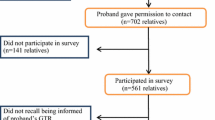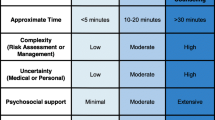Abstract
Familial communication of pathogenic genetic variants is necessary to maximize the clinical utility of genetic testing and its public health benefits. Insights to family communication considerations may be obtained from existing clinical documentation available in medical records. The goal of this study was to describe and characterize information about family communication of pathogenic variants and cascade genetic testing from genetic counseling summary notes. We completed structured content analysis of 656 summary notes describing pathogenic variants in breast cancer genes, for patients seen at a tertiary cancer center. Patients were 89.5% female, median age of 49 years, 32.6% non-White, and were counseled by 23 unique genetic counselors (GCs) with mean post-certification experience of 3.7 years. Cascade genetic testing was documented in 92.2% of all notes. Specific relatives (i.e., relationship to patient) who would benefit from genetic counseling and cascade testing were referenced in 33.1% of notes. Specific risk messaging was 2.5 times more likely to be present in notes of high- compared to moderate-risk genes (OR=2.53, 95% CI: 1.71-3.80), and when summary notes indicated the presence of a friend or relative (OR=2.29, 95% CI: 1.50-3.48). Summary notes frequently attempted to contextualize the patients’ familial relationships by referencing positive family communication patterns (41.6%) or negative communication issues (2.4%) and included various strategies to address barriers to communication and assist relatives with cascade testing. Overall, GCs consistently documented family communication recommendations when pathogenic variants are identified on patients’ genetic testing, albeit with heterogeneous use of specific communication prompts.

Similar content being viewed by others
Data Availability
Data is available from the corresponding author upon reasonable request.
References
Baker DL, Eash T, Schuette JL, Uhlmann WR (2002) Guidelines for Writing Letters to Patients. J Genet Couns 11(5):399–418
Brown E, Skinner M, Ashley S, Reed K, Dixon SD (2016) Assessment of the Readability of Genetic Counseling Patient Letters. J Genet Couns 25(3):454–460
Brown S, Puumala S, Leonhard J, Bell M, Flanagan J, Dean LW, Stein Q (2018) Genesurance Counseling: Genetic Counselors' Roles and Responsibilities in Regards to Genetic Insurance and Financial Topics. J Genet Couns 27(4):800–813
Carey JWaG (2008) D Systematic Methods for Collecting and Analyzing Multidisciplinary Team-Based Qualitative Data. In: G.a.M. Guest, K. M (ed) Handbook for Team-Based Qualitative Research. Altamira Press, Lanham, MD, pp 227–274
Clarke AJ (1997) The process of genetic counselling: Beyond nondirectiveness. In: Genetics, Society and Clinical Practice. Bios Scientific Publishers, Oxford, pp 179–200
Counseling, A.B.o.G. (n.d.) Find a certified genetic counselor. [cited 2020 November 11]; Available from: https://www.abgc.net/about-genetic-counseling/find-a-certified-counselor.aspx/.
Dattilo TM, Lipak KG, Clark OE, Gehred A, Sampson A, Quinn G et al (2020) Parent-Child Communication and Reproductive Considerations in Families with Genetic Cancer Predisposition Syndromes: A Systematic Review. J Adolesc Young Adult Oncol
Dheensa S, Lucassen A, Fenwick A (2018) Limitations and Pitfalls of Using Family Letters to Communicate Genetic Risk: a Qualitative Study with Patients and Healthcare Professionals. J Genet Couns 27(3):689–701
Eijzenga W, de Geus E, Aalfs CM, Menko FH, Sijmons RH, de Haes H et al (2018) How to support cancer genetics counselees in informing at-risk relatives? Lessons from a randomized controlled trial. Patient Educ Couns 101(9):1611–1619
Finlay E, Stopfer JE, Burlingame E, Evans KG, Nathanson KL, Weber BL, Armstrong K, Rebbeck TR, Domchek SM (2008) Factors determining dissemination of results and uptake of genetic testing in families with known BRCA1/2 mutations. Genet Test 12(1):81–91
Forbes Shepherd R, Browne TK, Warwick L (2017) A Relational Approach to Genetic Counseling for Hereditary Breast and Ovarian Cancer. J Genet Couns 26(2):283–299
Forrest LE, Delatycki MB, Curnow L, Skene L, Aitken M (2010) Genetic health professionals and the communication of genetic information in families: Practice during and after a genetic consultation. Am J Med Genet A 152a(6):1458–1466
Gaff CL, Clarke AJ, Atkinson P, Sivell S, Elwyn G, Iredale R, Thornton H, Dundon J, Shaw C, Edwards A (2007) Process and outcome in communication of genetic information within families: a systematic review. Eur J Hum Genet 15(10):999–1011
Kne A, Zierhut H, Baldinger S, Swenson KK, Mink P, Veach PM, Tsai ML (2017) Why Is Cancer Genetic Counseling Underutilized by Women Identified as at Risk for Hereditary Breast Cancer? Patient Perceptions of Barriers Following a Referral Letter. J Genet Couns 26(4):697–715
Lee C, Rivera-Valerio M, Bangash H, Prokop L, Kullo IJ (2019) New Case Detection by Cascade Testing in Familial Hypercholesterolemia: A Systematic Review of the Literature. Circ Genom Precis Med 12(11):e002723
Leenen CH, Heijer M, van der Meer C, Kuipers EJ, van Leerdam ME, Wagner A (2016) Genetic testing for Lynch syndrome: family communication and motivation. Fam Cancer 15(1):63–73
Li ST, Sun S, Lie D, Met-Domestici M, Courtney E, Menon S, Lim GH, Ngeow J (2018) Factors influencing the decision to share cancer genetic results among family members: An in-depth interview study of women in an Asian setting. Psychooncology 27(3):998–1004
Mendes Á, Paneque M, Sousa L, Clarke A, Sequeiros J (2016) How communication of genetic information within the family is addressed in genetic counselling: a systematic review of research evidence. Eur J Hum Genet 24(3):315–325
Roberts MC, Dotson WD, DeVore CS, Bednar EM, Bowen DJ, Ganiats TG, Green RF, Hurst GM, Philp AR, Ricker CN, Sturm AC, Trepanier AM, Williams JL, Zierhut HA, Wilemon KA, Hampel H (2018) Delivery Of Cascade Screening For Hereditary Conditions: A Scoping Review Of The Literature. Health Aff (Millwood) 37(5):801–808
Samadder NJ, Riegert-Johnson D, Boardman L, Rhodes D, Wick M, Okuno S et al (2020) Comparison of Universal Genetic Testing vs Guideline-Directed Targeted Testing for Patients With Hereditary Cancer Syndrome. JAMA Oncol
Sermijn E, Delesie L, Deschepper E, Pauwels I, Bonduelle M, Teugels E, de Grève J (2016) The impact of an interventional counselling procedure in families with a BRCA1/2 gene mutation: efficacy and safety. Fam Cancer 15(2):155–162
Srinivasan S, Won NY, Dotson WD, Wright ST, Roberts MC (2020) Barriers and facilitators for cascade testing in genetic conditions: a systematic review. Eur J Hum Genet 28:1631–1644
Tung N, Domchek SM, Stadler Z, Nathanson KL, Couch F, Garber JE, Offit K, Robson ME (2016) Counselling framework for moderate-penetrance cancer-susceptibility mutations. Nat Rev Clin Oncol 13(9):581–588
VandenBoom E, Trepanier AM, Carmany EP (2018) Assessment of Current Genetic Counselor Practices in Post-Visit Written Communications to Patients. J Genet Couns 27(3):681–688
Young AL, Butow PN, Tucker KM, Wakefield CE, Healey E, Williams R (2019) Challenges and strategies proposed by genetic health professionals to assist with family communication. Eur J Hum Genet 27(11):1630–1638
Funding
SM’s work is supported by a research training grant award from the Cancer Prevention and Research Institute of Texas – CPRIT (Award# RP170259). Erica M. Bednar’s work is supported by philanthropic contributions to The University of Texas MD Anderson Cancer Center Moon Shots Program, Cancer Prevention & Control Platform. This project was supported in part by a grant from NIH/NCI under award number P30CA016672 and used the Shared Decision Making Core.
Author information
Authors and Affiliations
Contributions
Concept and design: SM, HSS, SKP
Acquisition, analysis, or interpretation of data: SM, AB, LT
Drafting of the manuscript: All authors
Critical revision of the manuscript for important intellectual content: SM, EMB, HSS, RJV, SKP
Statistical analysis: SM
Administrative, technical, or material support: SM, BA, SKP
Supervision: RJV, BA, SKP
Corresponding author
Ethics declarations
Conflicts of interest
The authors have no relevant financial or non-financial interests to disclose.
Ethics approval
The study was approved by the ethics committee of UT MD Anderson Cancer Center. This research study was conducted retrospectively from data obtained for clinical purposes.
Consent to participate
We obtained a waiver of informed consent for the study.
Code availability
No custom code or software was used for this study.
Additional information
Publisher’s note
Springer Nature remains neutral with regard to jurisdictional claims in published maps and institutional affiliations.
Rights and permissions
About this article
Cite this article
Makhnoon, S., Smith, H.S., Bednar, E.M. et al. Disclosure of familial implications of pathogenic variants in breast-cancer genes to patients: Opportunity for prompting family communication. J Community Genet 12, 439–447 (2021). https://doi.org/10.1007/s12687-021-00504-9
Received:
Accepted:
Published:
Issue Date:
DOI: https://doi.org/10.1007/s12687-021-00504-9




